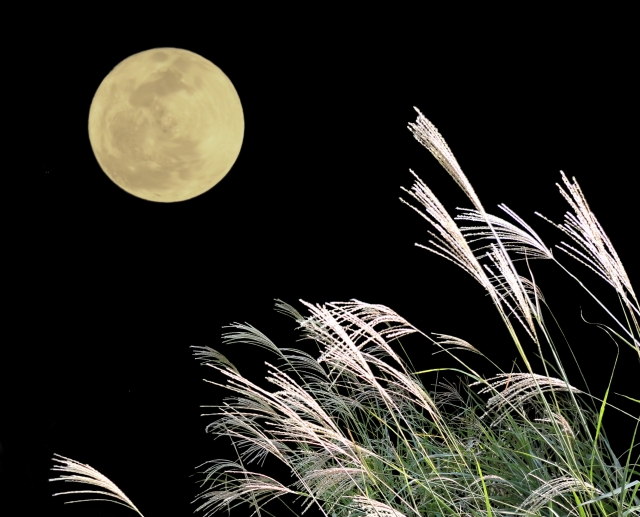The Making of ‘Silver Grass – Gold Moon’
– Oct. 3, 2023
This may be more a consideration of language and melody than a ‘Making’ story.
Aug. 12, 2021 : Composed.
Oct. 3, 2023 : Published.⇒ Silver Grass – Gold Moon

The first things I decided before writing this song are;
– The theme is autumn grass and the moon.
– Using the Japanese scale.
– Writing Japanese lyrics first.
And I wrote the lyrics below. — ‘Susuki’ is the Japanese silver grass.
Original Japanese Lyrics:
Kawara Susuki-no Kin-no honi
Tsuki-no hikari-no gin-no kona
Translated into English:
On the golden Susuki of riverbank
Silver powder of the moon falls.
Please note that the Japanese lyrics have the same number of vowels in each line.
And don’t worry about the order of gold and silver for now.
This is the first time I wrote a lyrics before making a song, and I could make the first phrase soon.

The phrase first I made
But I couldn’t go further. I found that I had three problems.
The first. I couldn’t write the lyrics any further from this. These two lines are the whole scene I imagined. But they were too short to complete a song.
The second was the colors of Susuki and the moon. The moon I imagined was high in the sky, so it’s shining ‘Silver’. On the other hand, the Susuki were close to me and I could see the color well, so it should be ‘Gold’. However, when I looked up it, I found that the English name of Susuki is ‘Silver’ grass. What’s more, the moon in the photos with Susuki was low in the sky, so it shines ‘Gold’.
However, these two problems were not problems of composition. But the third one was about composing. It was, when I made a melody according to the Japanese lyrics, I could make it ‘too’ easy. I think this is due to the characteristics of the Japanese language.
Melody is made by rhythm and pitch. First, talk about rhythm. English is a language that allows freedom in the length of pronunciation and assigns meaning to length. For example, “Good” is pronounced short when we say “Good Morning.” and when we see something wonderful, pronounce it longer, like “Goooood!” If someone says “Gooood Morning.”, I get the feeling that he is trying to say something different from a normal greeting.
Japanese, on the other hand, speaks with a very precise rhythm and does not vary in length. In musical notation, they are all eighth notes. When the same vowel is repeated twice, as in “To O Ri” (street), it is exactly a quarter note. Japanese has a pronunciation that skips one sound. In that case, it is exactly an eighth rest. The only place a word is pronounced without determining its length is where one clause ends. In the score above, it’s a half note. To say exactly, it doesn’t have to be a half note long, it can be any length until you want to say the next word. (So I didn’t play the notes at ‘a tempo‘.)
Of course, as a music, the length of any note in the song can be freely changed, but the rhythm of a normal Japanese reading is fixed.
And about pitch. English is a language of stress accents. For example, in “Body”, say the “o” strongly. If you say the “y” strongly, it will not sound like English.
On the other hand, Japanese is a language with a pitch accent, and in some case, if you use the wrong pitch, the meaning may not be understood. For example, the word “A Shi” means “reed'” if you say “A” in a high pitch and “Shi” in a lower pitch, but if you reverse the pitch, it means “foot.” Unlike music, it doesn’t need exact pitch, so when making it in a song, I can increase or decrease the pitch difference, but if I reverse the higher and lower, it will sound unnatural in Japanese. There are a lot of Japanese songs with reversed pitch, but they can’t be said to be natural Japanese.
Because of these characteristics of the Japanese language, the lengths and pitches are roughly determined by just reading the lyrics as a normal Japanese sentence. And the Japanese scale has only five notes, so I can only choose a few pitches. Therefore, I could make the melody ‘too’ easy. It may be good, but boring. I want to enjoy creating songs, not lyrics. 🙂
In the end, I reversed ‘Silver’ and ‘Gold’, and abandoned the lyrics. I remake the first phrase just seeing the moon and silver grass photo, and was no longer restricted by lyrics, I could make the next phrase freely.
Making this song, I found that it’s very natural for a Japanese to make a song about the Japanese theme with the Japanese scale. It’s more ‘natural’ than ‘easy’.
Spanish guitar songs are truly enchanting. I don’t think I could write such beautiful songs, but for Spanish composers, those songs may be the natural song that comes from them.
On the other hand, Spanish composers may not be able to make the Japanese style songs. If it’s so, my song may have some meaning in the world.
The score and my performance of the whole song are below.